The U.S. visitor visa, formally known as the B-2 visa, allows foreign nationals to travel to the United States for tourism, vacation, or to visit family and friends. As global mobility trends and geopolitical situations evolve, updates and changes regarding U.S. visitor visa policies frequently emerge. This article provides an overview of the latest news and developments related to https://www.alnewsbreak.com/ for the USA.
1. Recent Policy Changes and Updates
1.1. Visa Processing Times
- Extended Wait Times: Recent reports have highlighted extended processing times for visitor visas due to increased demand and backlogs. Applicants may experience delays of several months or more before receiving a decision on their visa applications.
- Consular Services: The U.S. Department of State has been working to address these delays by increasing staffing and improving processing efficiencies. However, challenges such as staffing shortages and high application volumes continue to affect processing times.
1.2. Entry Requirements and Restrictions
- COVID-19 Impact: Although many COVID-19-related restrictions have been eased, travelers should be aware of any remaining health and safety requirements. This includes possible vaccination requirements, testing protocols, and quarantine measures depending on the current guidelines.
- Travel Bans and Restrictions: Changes in international relations and health concerns can lead to shifts in travel bans or restrictions. It is crucial for prospective travelers to stay updated on any new policies that could impact their ability to enter the U.S.
2. Recent Legislative and Administrative Actions
2.1. Visa Application Fee Changes
- Fee Adjustments: There have been recent changes in the visa application fees, which can affect the cost of obtaining a visitor visa. The Department of State periodically reviews and adjusts these fees based on operational costs and policy changes.
- Fee Waivers: In certain cases, fee waivers or reductions may be available for specific categories of visitors or under particular circumstances. Applicants should check the latest guidelines to determine if they qualify for any fee concessions.
2.2. Visa Waiver Program (VWP) Updates
- Program Eligibility: For travelers from Visa Waiver Program countries, there are updates regarding eligibility and application processes for the Electronic System for Travel Authorization (ESTA). Changes in the VWP can affect how travelers from participating countries can enter the U.S. without a traditional visa.
- Security Enhancements: The VWP is periodically updated to enhance security measures and streamline the entry process. Travelers should stay informed about any changes to ESTA requirements and procedures.
3. Challenges and Opportunities
3.1. Backlogs and Delays
- Impact on Tourism: Extended visa processing times can impact tourism and family visits, leading to uncertainty for travelers planning trips to the U.S. The tourism industry and businesses reliant on international visitors are particularly affected by these delays.
- Strategies for Mitigation: The U.S. government is exploring various strategies to address visa processing backlogs, including increasing staffing levels at consulates and implementing more efficient processing technologies.
3.2. Enhanced Security Measures
- Increased Scrutiny: Enhanced security measures may lead to more rigorous background checks and increased scrutiny during the visa application process. Applicants should be prepared to provide thorough documentation and answer detailed questions during their interviews.
- Improved Procedures: While security measures are essential for safeguarding the nation, improvements in procedures and transparency can help streamline the application process and reduce applicant stress.
4. Guidance for Applicants
4.1. Application Tips
- Preparing Documentation: Applicants should ensure that they provide all required documentation, including proof of financial stability, travel itinerary, and evidence of ties to their home country. Proper preparation can help facilitate a smoother application process.
- Interview Preparation: During the visa interview, applicants should be clear and concise in their responses and provide honest information. Being well-prepared can help address any concerns that consular officers may have.
4.2. Staying Informed
- Monitoring Updates: Applicants should regularly check the U.S. Department of State’s website and other official sources for the latest updates on visa policies, application procedures, and entry requirements.
- Seeking Professional Advice: For complex cases or if facing difficulties, applicants may consider consulting with an immigration attorney or visa specialist for guidance and support.
5. Looking Ahead
5.1. Future Developments
- Policy Reviews: The U.S. government continues to review and update visa policies in response to changing global conditions and domestic needs. Future developments may include adjustments to processing times, fee structures, and security measures.
- Technological Advancements: Advances in technology and digital processes may further streamline the visa application process and improve efficiency. Monitoring these developments can provide applicants with insights into potential changes that could affect their applications.
5.2. Addressing Challenges
- Streamlining Processes: Efforts to streamline visa processing and reduce backlogs are ongoing. The U.S. government is likely to continue implementing measures to improve the efficiency and effectiveness of the visa system.
- Balancing Security and Accessibility: Striking a balance between security and accessibility will remain a key focus. Ensuring that security measures do not unduly burden legitimate travelers is crucial for maintaining the effectiveness of the visa system.
Conclusion
The U.S. visitor visa landscape is continuously evolving, influenced by policy changes, global events, and administrative actions. Staying informed about the latest updates and understanding the application process are essential for those seeking to visit the United States. As the U.S. government works to address challenges and improve visa services, travelers and applicants should remain vigilant and proactive in managing their visa-related needs.

